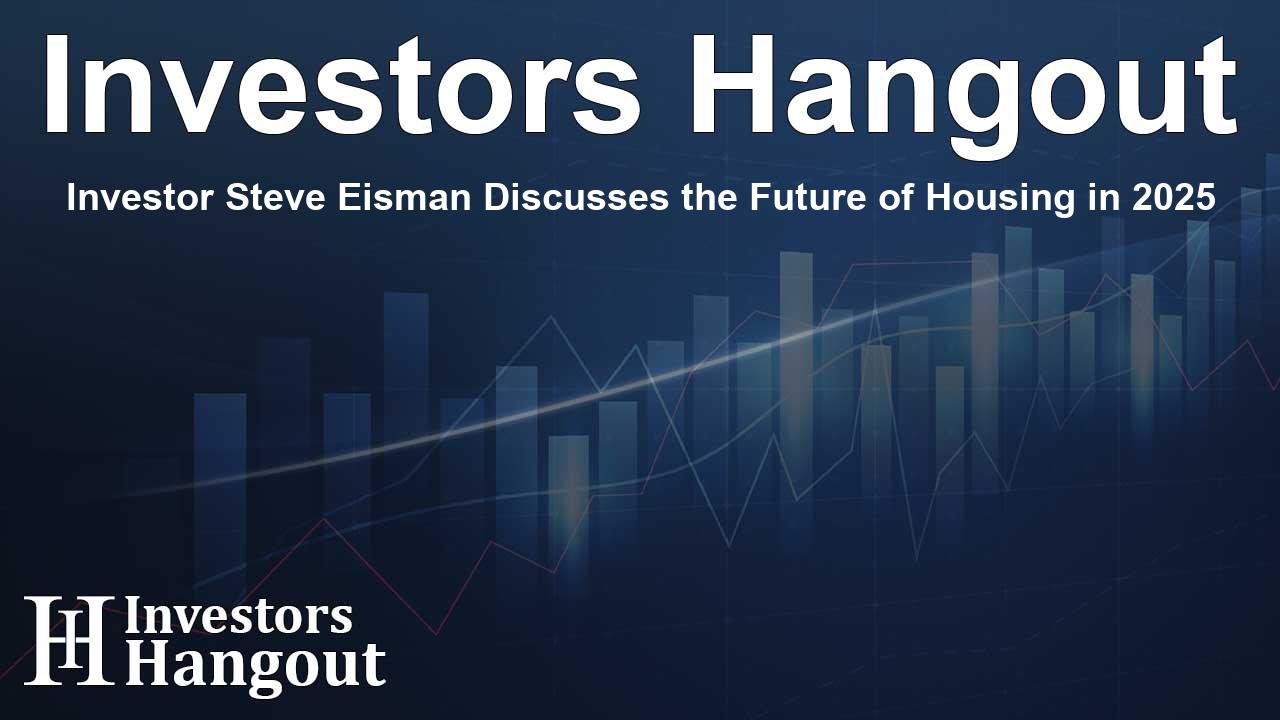Investor Steve Eisman Discusses the Future of Housing in 2025

Steve Eisman and His Market Insights
Investor Steve Eisman, best known for his foresight during the 2008 subprime mortgage crisis, has recently provided his perspective on the housing market. Despite popular beliefs regarding an imminent crash in 2025, Eisman remains optimistic and sees no signs of a similar crisis brewing.
Understanding Current Market Dynamics
Comparison of Past and Present Conditions
During a recent podcast episode titled The Real Eisman Playbook, he expressed that the housing market's current dynamics are fundamentally different from those during the last crisis. Eisman emphasized that the main issues faced today stem from sharply increased mortgage rates rather than problematic subprime lending practices.
The Impact of Rising Mortgage Rates
Eisman explained that many homeowners have locked in low interest rates due to refinancing options. Most existing homeowners secured 30-year loans at rates ranging from 3% to 4%, while new buyers are facing rates that can reach up to 7%. This stark contrast has created a standoff between buyers and sellers.
The Stalemate in the Housing Market
In this locked situation, Eisman notes that the price adjustments required to accommodate new mortgage rates are significant. To match the same monthly payment, home prices would need to be drastically reduced, potentially cut in half. This creates a conundrum where homeowners are hesitant to sell due to the high mortgage rates on their current loans.
Subprime Lending in Focus
Regulatory Changes Post-Crisis
Eisman pointed out that regulatory changes following the Dodd-Frank Act have also played a key role in shaping the current lending landscape. The new regulation increased the capital requirements for issuing subprime loans, effectively reducing their availability. Although a few smaller financial institutions may still offer these loans, Eisman insists it constitutes a tiny portion of the overall lending market.
Market Predictions and Consumer Sentiment
Addressing the prevalent fears in the market, Eisman remarked, “People just love to predict the end of the world.” Drawing from his history of predictions, he appears confident that there's no compelling evidence to support such a doomsday scenario in the housing sector.
Market Trends and Future Outlook
Fluctuating Home Prices
Experts, including Nicholas Godec from S&P Dow Jones Indices, have observed that home prices are not keeping pace with inflation rates, which raises concerns about the long-term stability of the housing market. The recent decline in U.S. home prices for three consecutive months for the first time since 2010 has sparked discussions about potential downturns.
Historical Context and Current Challenges
The overall real estate market plays a significant role in the economy, and fluctuations can impact broader economic trends. Experts are closely monitoring various factors that could influence housing stability, including economic policies, interest rates, and consumer confidence.
Conclusion: A Cautious Outlook
While some analysts express concern about the housing market's immediate future, Steve Eisman's insights provide a refreshing counter-narrative. He emphasizes the unique conditions currently at play in the market, suggesting that fears may be overstated. As the housing landscape continues to evolve, it remains essential for stakeholders to remain informed and adaptable to ongoing changes.
Frequently Asked Questions
What are Steve Eisman's views on a potential housing crisis in 2025?
Steve Eisman believes the current market dynamics are fundamentally different from those prior to the 2008 crisis, and he sees no signs of an impending crisis.
Why does Eisman say the current housing market is "locked"?
He indicates that existing homeowners with low mortgage rates are reluctant to sell, creating a standoff with new buyers facing much higher rates.
What impact has Dodd-Frank had on the housing market?
Dodd-Frank regulations raised capital requirements on subprime loans, significantly reducing their prevalence in today’s market.
What trends are emerging in home prices?
Experts are noting that for the first time in years, home prices are failing to keep pace with broader inflation, which might signal a shift in market dynamics.
How should buyers and sellers navigate the current housing market?
Both parties should stay informed about prevailing interest rates, housing demand, and broader economic indicators to make sound decisions in this evolving landscape.
About The Author
Contact Riley Hayes privately here. Or send an email with ATTN: Riley Hayes as the subject to contact@investorshangout.com.
About Investors Hangout
Investors Hangout is a leading online stock forum for financial discussion and learning, offering a wide range of free tools and resources. It draws in traders of all levels, who exchange market knowledge, investigate trading tactics, and keep an eye on industry developments in real time. Featuring financial articles, stock message boards, quotes, charts, company profiles, and live news updates. Through cooperative learning and a wealth of informational resources, it helps users from novices creating their first portfolios to experts honing their techniques. Join Investors Hangout today: https://investorshangout.com/
The content of this article is based on factual, publicly available information and does not represent legal, financial, or investment advice. Investors Hangout does not offer financial advice, and the author is not a licensed financial advisor. Consult a qualified advisor before making any financial or investment decisions based on this article. This article should not be considered advice to purchase, sell, or hold any securities or other investments. If any of the material provided here is inaccurate, please contact us for corrections.
